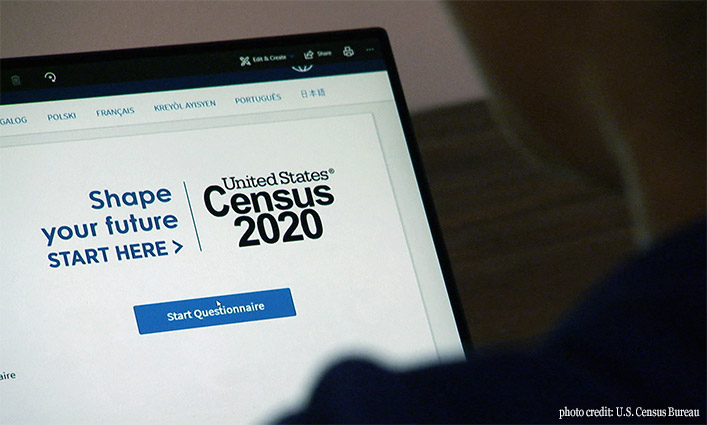
The Covid-19 crisis has had an impact on every aspect of our lives, but the 2020 Census is still happening and it’s absolutely critical that every one of us is counted. “We’ve had to move all of our Census efforts online, which has made things a bit more complicated, but we have found innovative ways to still get the word out,” says Zhanay Thomas ’23, a John Jay student and member of the CUNY Census Corps. From the comfort of her home in the Bronx, New York, Thomas and other CUNY Census Corps students are maintaining their social distance, all while educating their communities about the 2020 Census. “The Census affects funding for so many things, including health care. Look at what we’re experiencing right now in this country. This is a public health crisis that’s impacting our communities. Look at how the lack of resources is hurting the City’s most underserved and underrepresented communities, which are usually the most undercounted areas,” says Thomas. “We need to count every single person for the 2020 Census, so that we can ensure we get the funding to support our medical and health care institutions. This funding can save lives.” We spoke with Thomas to learn more about what she’s doing to promote the Census.
“We need to count every single person for the 2020 Census, so that we can ensure we get the funding to support our medical and health care institutions. This funding can save lives.” —Zhanay Thomas
What made you want to join the CUNY Census Corp?
I’ve been living in my neighborhood in the Bronx for eight years, and when I think back to when we first moved here, and compare it to now, I see nothing has really changed. As I learned more about the Census, I was surprised to see how it impacts so many parts of our daily lives. Wanting a positive change for my community, I knew that filling out the 2020 Census and working with CUNY Census Corps could help achieve that goal.
What were the biggest takeaways you learned during the CUNY Census Corps training process?
One of the most interesting takeaways from the training was that you don’t have to put your birth name on the Census, you can write down an alias, and that surprised me. It emphasizes the fact that the Census has no underlying motives. Its only goal is to ensure the complete count of everyone in an area. Another key takeaway is all the essential industries the Census impacts. The funding the states receive as a result of the Census helps build roads, hospitals, and schools, and provides funds for public assistance programs and health care programs that are needed, especially in underserved and underrepresented communities.
“The Census has no underlying motives. Its only goal is to ensure the complete count of everyone in an area.” —Zhanay Thomas
What are some of the basic messages that you’re trying to get across to people regarding the Census? Are there any “Census myths” you’re hoping to dispel?
One of the most important things I’m trying to get across to people is how quick and simple it is to fill out the Census—it takes less than 10 minutes. And you can fill it out online, via phone call, or by mail, it’s so easy. When it comes to “Census myths” the ones I’ve worked hard to dispel is regarding immigration and landlords. It’s important to remember that the Census is for everyone, regardless of immigration status. The information you share on the Census cannot be shared with any government agency, law enforcement agency, IRS, or your landlord. I’ve interacted with a lot of individuals who fear that the Census is working with the IRS or with their landlord. I would just like to assure everyone that the Census does not partner with any of these entities, in fact it is illegal to do so.
“The funding the states receive as a result of the Census helps build roads, hospitals, and schools, and provides funds for public assistance programs and health care programs that are needed, especially in underserved and underrepresented communities.” —Zhanay Thomas
We’ve had to readjust how we live life, how we learn, and how we do things. Now that we’re practicing social distancing, how are you educating others on why the Census is important?
CUNY Census Corps students have shifted their strategy to focus on using social media. It’s one of the most effective ways to get our message across, so we’re utilizing it to the best of our abilities. We’re emphasizing the importance of the Census by creating a lot of short, eye-catching posts explaining what the Census is and what it can do for our communities. And, many CUNY Census Corps students have created challenges on their social media pages, where they challenge select followers to fill out the Census, and then those selected choose others to challenge, and so on.
What would you tell someone who doesn’t feel like it’s important or necessary to fill out the Census—especially during our current circumstances?
I would remind them of why it’s important to fill out the Census. And I’d show them why—especially during the current circumstances—we need to fill it out. If we don’t fill out the Census, hospitals will not receive the proper funding for the resources and equipment they need. Additionally, if we do not fill out the Census, areas that require a hospital or urgent care facility to be built will not receive it.
“The Census is for everyone, regardless of immigration status. The information you share on the Census cannot be shared with any government agency, law enforcement agency, IRS, or your landlord.” —Zhanay Thomas
What’s your favorite “Census 2020” story that you’ve experienced?
I live in a Jamaican household, where my grandma is the head of the family, and so, in shorter terms, it can be considered a “skeptical household.” I had to convince my grandma to fill out the Census, and it was not easy. I explained to her what the Census is, it’s purpose, and why it was important to fill it out, and that still wasn’t enough for her. She was really skeptical because she believes the government just wants to know people’s information. I told her about Title 13 which makes it illegal for the information from the Census to be shared, and then I let her think about it. A couple of days later she approached me and told me to fill out the Census on behalf of our entire household. It was a boost in my self confidence because if I could get my extremely skeptical grandma to change her opinion about the Census, I could hopefully get others to fill it out too.



